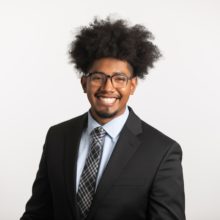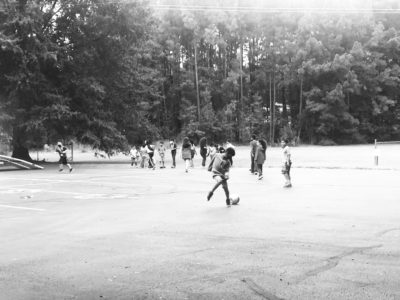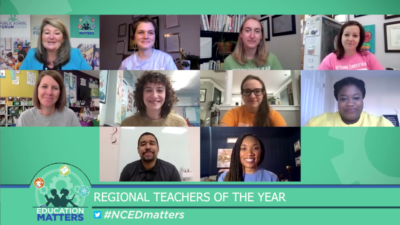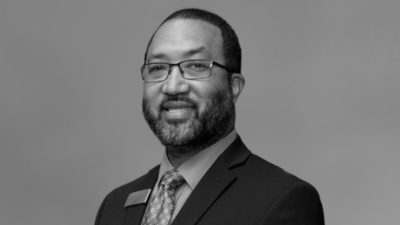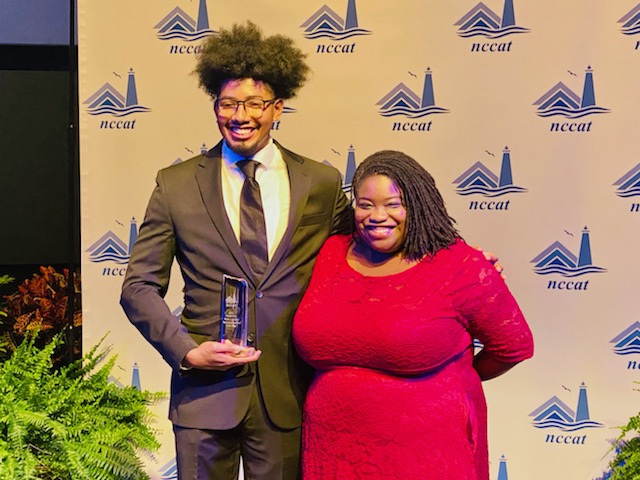

On Thursday, February 17, I was named the NCCAT 2022 Prudential North Carolina Beginning Teacher of the Year.
The odds of me winning this recognition were incredibly low – not because there is a deficit in my work ethic, teaching skills, or character, but because there are several societal factors that have inhibited and discouraged many Black men from becoming educators. In fact, less than 2% of educators in the United States are Black men. If you applied to Harvard University in the last year, you would have a higher chance (3.4%) of getting admitted into the university than having a Black man be your teacher while there. The unfortunate reality is that Black men are just one of several identities — like teachers with a disability — that are underrepresented in the identities of educators in the United States.
At the end of my acceptance speech, I made the following statement: “I’ve learned that being a good teacher means having high expectations for your students, so students of Orange High School, I expect some of y’all to be up here one day.”
I issued this challenge to all of the students at Orange High School: students of all races, students of all economic backgrounds, students of all countries of origin, students of all sexual orientations and gender identities, students of all learning and physical abilities, students of all religious traditions, and students of all political backgrounds. But, due to societal structures, certain students will statistically be less equipped or less encouraged to accomplish this goal.
Within the education system, we have failed to adequately cultivate the gifts of students of color by having lower expectations of success for them. For queer students, we have not always created learning environments that welcome and cherish their identities. In turn, we have increased their risk of having a lower quality of mental health, which can reduce their neurological ability to learn new information. Outside the immediate control of our classrooms, there are factors like COVID-19 that have exacerbated the need for additional educational resources in rural communities. There is also a need for the federal government to equip educators with the means necessary to best empower English Language Learners. After a student leaves the sphere of K-12 education, individuals from low-income backgrounds have less of an incentive to become public educators because the pay is less likely to help them and their families get out of poverty, which is compounded by factors like student debt. And, in the rare moment in which a Black man enters education, there is a sense of loneliness and racial discrimination. The statistical odds of certain students becoming future Beginning Teachers of the Year says nothing about them as students, but it says everything about the way our society is structured.
In other words, as I accept the title of Beginning Teacher of the Year, I welcome narratives that describe me as excellent, but I reject depictions of me as being an exceptional Black man: the notion of a talented 10th fails to ask for enough from ourselves and society.
To make the educators in North Carolina more reflective of the student bodies that we teach, “we must cultivate the genius of all students in North Carolina” — as 2021 North Carolina Teacher of the Year Eugenia Floyd has put it. To do so, educators and politicians must examine and address the ways that we have failed students in our schools. In writing this article, I understand the optics: I am a young, enthusiastic, and well-intended educator that has hyperlinked a few social-justice related articles to call our state into better educational practices, but I seemingly have the lack of experience to understand that people have both been calling for and working toward change for years but have met active resistance in the work that they are doing, or I am completely misguided in my belief that the education system is not serving all students well. After all, I am just the Beginning Teacher of the Year.
Yet I am deeply convinced that both of these groups are wrong.
In my classroom, I have structured my class’s approach to history to be in line with the “Sankofa” method of thinking: we analyze the victories and shortcomings of our world’s history to work toward making society a better place for all people. As I turn toward the history of my own people, I am quite literally left with only the option of being hopeful that public education will get better. By hope, I do not mean the willfully ignorant and baseless sense of optimism that some people burn through quickly. Rather, I mean hope in the sense that Cornel West means when he talks about being a hope.
My ancestors that were enslaved Africans in this country had few external reasons to believe that they would become free, but through their ordinary practices of singing, pursuing freedom in Canada or Mexico, and self-education they became and created the hope that they needed for emancipation. The same is true of my Mexican ancestors that wrestled against the powers of Spanish colonialism to eventually declare themselves independent in 1821.
As the NC Beginning Teacher of the Year, I am defining my role in this position to be dedicated to the cause of listening to and acting upon the needs of all of my students in Orange High School while also beginning the process to understand the needs of students from different parts of the state. I invite all North Carolinians — community members, parents, teachers, board members, superintendents, politicians, and others — to join me in this process of love, justice, truth, and hope.
